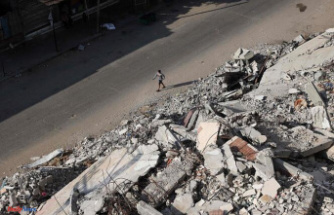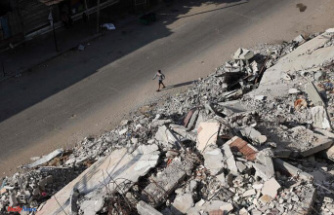Usually, South Korea, Japan, and the United States publicly confirm North Korean missile launch, which are prohibited by U.N. resolutions, as soon as they happen. They did not confirm Thursday's launch, which suggests that the weapon being tested might have been of a different type. Seoul's Joint Chiefs of Staff stated Friday that U.S. intelligence officials and South Korean intelligence officers monitored North Korean moves but did not elaborate.
After a six-month hiatus, North Korea resumed its missile testing three weeks ago. The North mixed the show of force and a more conciliatory gesture earlier this week, offering to reactivate hotlines used by North and South Korea to arrange meetings, cross border crossings, and avoid accidental clashes, as it has done in the past.
Since early 2019, diplomacy to get the North to give up its nuclear arsenal in exchange for political and economic rewards has been largely deadlocked. This has put North Korea under severe U.S.-led economic sanctions at a time its fragile economy is facing massive setbacks from the coronavirus epidemic. The North appears to be trying to pressure South Korea to ease the sanctions.
The Korean Central News Agency stated Friday that the test of anti-aircraft weapons was "very practical" in the study and development of various anti-aircraft weapon systems.
Kim Dong-yub is a professor at University of North Korean Studies Seoul. He said that the launch was the first stage of a test to create a missile capable of shooting down enemy aircraft and missiles. The missile is similar to the Russian-made S-400 anti-missile system. It has a maximum range 400 km (250 miles), and can intercept stealth planes.
In his latest mixed signal earlier this week, North Korea's leader Kim Jong Un stated that he was open to restoring communication hotlines between South Korea and North Korea in the coming days. However, he dismissed U.S. offers of dialogue as a "cunning" cover for its hostility towards the North. If South Korea wants to see improvement in Korean relations, he demanded that it abandon its "double-dealing" attitude. His remarks were echoed by , his powerful sister who is leading the North's ongoing pressure campaign.
South Korea said that it will prepare for the restoration cross-border phone lines and fax lines. These lines have been dormant for over a year. According to Seoul's Unifications Ministry, North Korea was still not responding to South Korea's attempts to communicate through these channels as of Friday afternoon.
Moon Jae-in, the South Korean President, vowed to resist any threat to his people's lives during Friday's Armed Forces Day ceremony and to work for lasting peace. He did not mention recent North Korean tests, in an effort to preserve the possibility of negotiations between the Koreas.
U.S. Secretary Antony Blinken said Thursday to reporters that Washington supports inter-Korean talks in principle. He said that the U.S. was concerned by North Korea's recent missile launches. These were in violation U.N Security Council resolutions, and created "greater chances for instability and insecurity."
Resolutions of the U.N. ban North Korea's ballistic activities.
A new hypersonic missile, newly developed cruise missile, and a ballistic missile fired from a train were some of the weapons North Korea tested in September. The hypersonic missile was not yet ready for prime time, according to South Korea's military. However, experts believe the North used the other weapons to demonstrate its ability to strike targets in South Korea or Japan, important allies of the United States that host American troops. The U.S. Indo-Pacific Command stated earlier this week that it remains committed to the defense of South Korea, Japan and other countries.
For the past four years, North Korea hasn't tested a long-range missile capable reaching the U.S. continent -- experts believe this is an indication that it is calibrating its provocations in order to maintain its diplomatic chances.












